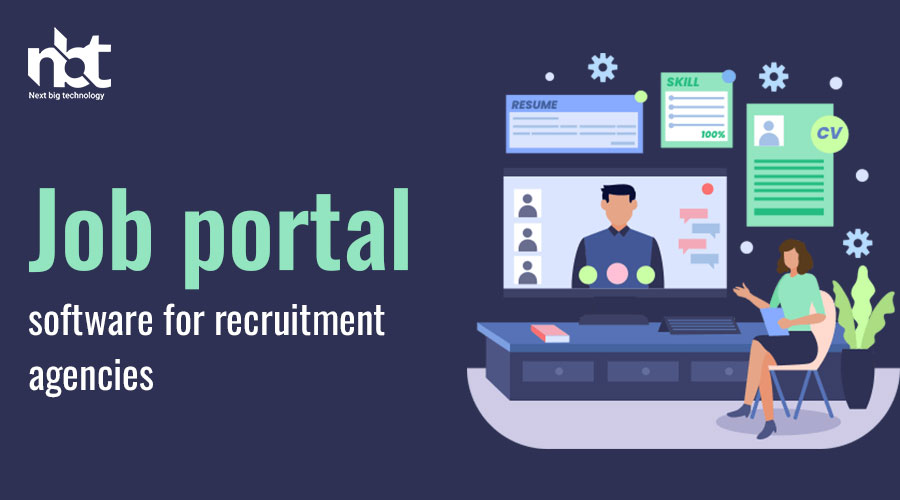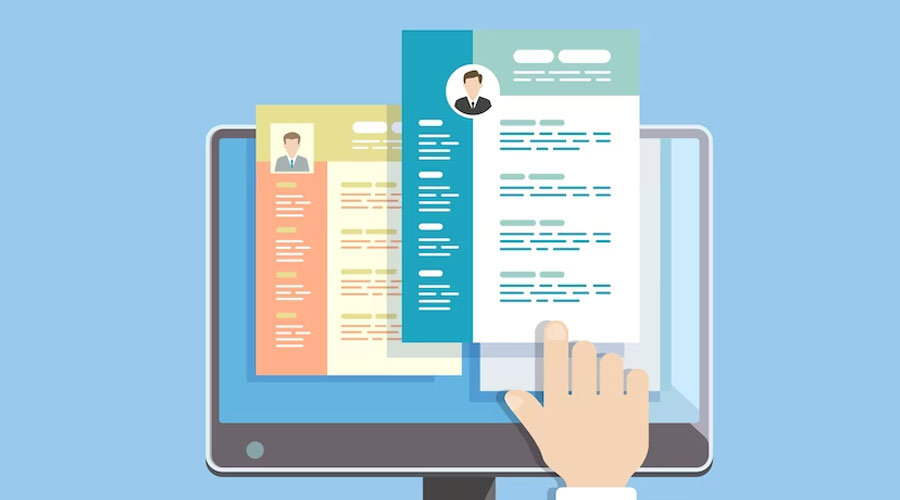Table of Contents
Job portal software for recruitment agencies Services
In today’s competitive job market, recruitment agencies are constantly seeking innovative solutions to enhance their efficiency and effectiveness. One such solution that has gained immense popularity is job portal software tailored specifically for recruitment agencies. This software revolutionizes the way agencies manage their hiring processes, offering a myriad of benefits that streamline operations and drive success.
Simplified Candidate Management: One of the primary advantages of using job portal software is the simplified candidate management it offers. Recruitment agencies deal with a vast pool of candidates daily, and manually tracking each applicant’s progress can be daunting. With job portal software, agencies can effortlessly manage candidate profiles, track their progress through various stages of the recruitment process, and communicate with them seamlessly.
Enhanced Job Posting and Distribution: Job portal software empowers recruitment agencies to create and post job vacancies across multiple platforms effortlessly. This ensures maximum visibility for job openings, attracting a diverse range of candidates. Additionally, the software facilitates targeted job distribution, allowing agencies to reach specific demographics or niche talent pools efficiently.
Advanced Candidate Screening and Assessment: Efficient candidate screening is crucial for recruitment agencies to identify the most qualified candidates quickly. Job portal software often includes advanced screening and assessment features, such as customizable filters and pre-employment assessments, enabling agencies to identify the best-fit candidates efficiently. This streamlines the selection process and significantly reduces time-to-hire.
Seamless Collaboration and Communication: Effective communication and collaboration are essential for successful recruitment outcomes. Job portal software provides a centralized platform where recruiters, hiring managers, and candidates can collaborate seamlessly. Features like real-time messaging, interview scheduling, and feedback management streamline communication workflows, ensuring everyone stays informed and engaged throughout the hiring process.
Comprehensive Analytics and Reporting: Data-driven insights are instrumental in optimizing recruitment strategies and improving overall performance. Job portal software offers comprehensive analytics and reporting functionalities, providing recruitment agencies with valuable insights into their hiring processes. From candidate sourcing analytics to performance metrics for individual recruiters, these insights enable agencies to identify areas for improvement and make data-driven decisions.
Customization and Scalability: Every recruitment agency operates differently, with unique workflows and requirements. Job portal software offers customizable solutions tailored to meet the specific needs of each agency. From customizable job templates to flexible workflow configurations, agencies can adapt the software to align with their existing processes seamlessly. Furthermore, job portal software is highly scalable, allowing agencies to expand their operations without worrying about outgrowing their software solution.
How to Create a Job portal software for recruitment agencies
In the fast-paced realm of recruitment, having a tailored job portal software can make all the difference for agencies striving to streamline their processes and connect the right talent with the right opportunities. Crafting your own job portal software can seem like a daunting task, but with the right approach, it’s entirely achievable. Let’s delve into the step-by-step process of creating a robust job portal software for recruitment agencies.
Understanding Requirements and Planning: Before diving into development, it’s crucial to understand the specific needs and requirements of your recruitment agency. Take time to analyze the workflows, the volume of job postings, candidate applications, and the overall functionality you envision for your job portal software. This preliminary planning phase lays the foundation for a successful development process.
Choose the Right Technology Stack: Selecting the appropriate technology stack is pivotal for the performance and scalability of your job portal software. Consider factors such as programming languages, frameworks, and databases that align with your project requirements and development team expertise. Popular choices for building job portals include PHP, Python, Ruby on Rails, and Java.
Designing User Interfaces: User experience is paramount in job portal software. Design intuitive and user-friendly interfaces for both recruiters and job seekers. Recruiters should have easy access to features like job posting, applicant tracking, and candidate management, while job seekers should be able to search and apply for jobs seamlessly. Incorporating responsive design principles ensures accessibility across various devices.
Implementing Core Features:
The functionality of your job portal software is what sets it apart. Key features to incorporate include:
- Job Posting and Management: Enable recruiters to create and manage job postings efficiently, including details like job title, description, requirements, and application deadlines.
- Candidate Database and Tracking: Build a robust database to store candidate profiles and track their application statuses throughout the recruitment process.
- Search and Filters: Implement advanced search and filtering options to enable job seekers to find relevant job listings based on criteria such as location, industry, and experience level.
- Application Management: Streamline the application process with features like resume parsing, application tracking, and communication tools for seamless interaction between recruiters and candidates.
- Analytics and Reporting: Incorporate analytics tools to provide insights into job performance, applicant demographics, and other metrics to optimize recruitment strategies.
Testing and Quality Assurance: Thorough testing is essential to ensure the functionality, security, and performance of your job portal software. Conduct rigorous testing across various scenarios to identify and address any bugs or issues. Additionally, prioritize security measures to protect sensitive data and ensure compliance with privacy regulations like GDPR.
Deployment and Maintenance: Once testing is complete, deploy your job portal software to production environments. Monitor its performance post-deployment and address any issues that may arise promptly. Regular maintenance and updates are crucial to keeping your job portal software secure and up-to-date with evolving technological trends.
Why Should You Go for Job portal software for recruitment agencies
In today’s dynamic job market, recruitment agencies face increasing pressure to streamline their operations and deliver top-notch services to clients and candidates alike. With the advent of technology, traditional recruitment methods have evolved, giving rise to innovative solutions such as job portal software. These platforms offer a myriad of benefits that can significantly enhance the efficiency and effectiveness of recruitment agencies. Let’s delve into why opting for job portal software is a strategic move for any recruitment agency.
- Centralized Platform: Job portal software serves as a centralized hub where recruiters can manage all aspects of the recruitment process. From posting job openings to screening candidates and scheduling interviews, everything can be conveniently handled within one platform. This streamlines workflows, minimizes administrative tasks, and ensures better organization of data.
- Wider Reach: By leveraging job portal software, recruitment agencies can extend their reach to a broader pool of candidates. These platforms often have a vast network and attract job seekers from various industries and geographical locations. This expanded reach increases the chances of finding the perfect match for each job opening, thereby reducing time-to-fill metrics.
- Enhanced Candidate Experience: Job portal software offers a user-friendly interface that enhances the candidate experience. Applicants can easily search and apply for jobs, upload their resumes, and track the status of their applications in real-time. This transparency fosters positive relationships between candidates and recruitment agencies, leading to higher satisfaction levels and better brand reputation.
- Advanced Search and Matching Algorithms: Modern job portal software utilizes sophisticated algorithms to match candidates with suitable job opportunities. Recruiters can set specific criteria such as skills, experience, and qualifications, and the software automatically identifies the most relevant candidates from the database. This saves time and effort while ensuring a higher quality of matches.
- Customization and Branding: Job portal software can be customized to reflect the branding and unique requirements of each recruitment agency. From personalized job listings to branded communication templates, these platforms allow agencies to maintain a consistent brand image throughout the recruitment process. This not only enhances brand visibility but also instills confidence in both clients and candidates.
- Data-driven Insights: Another compelling reason to invest in job portal software is the access to valuable data and analytics. These platforms generate insights into recruitment metrics such as application rates, candidate demographics, and hiring trends. By analyzing this data, recruitment agencies can make informed decisions, optimize their strategies, and continuously improve their processes.
- Cost-effectiveness: While there is an initial investment involved in implementing job portal software, it ultimately proves to be cost-effective in the long run. The automation of repetitive tasks, reduction in manual errors, and improved efficiency lead to significant cost savings for recruitment agencies. Moreover, the ability to scale operations without proportional increases in overhead costs makes job portal software a financially sound choice.
Market Prospects of Custom Job portal software for recruitment agencies and Platforms
In the ever-evolving landscape of recruitment, technology plays a pivotal role in streamlining processes and enhancing efficiency. One such technological advancement that has garnered significant attention is custom job portal software tailored specifically for recruitment agencies and platforms. These bespoke solutions offer a myriad of benefits, ranging from enhanced candidate sourcing to improved client management. In this article, we delve into the promising market prospects of custom job portal software and its implications for the recruitment industry.
- Addressing Unique Needs: One of the primary advantages of custom job portal software is its ability to address the unique requirements of recruitment agencies and platforms. Unlike off-the-shelf solutions that offer a one-size-fits-all approach, custom software can be tailored to accommodate specific workflows, preferences, and branding elements. This customization fosters greater operational efficiency and ensures seamless integration with existing systems, thereby enhancing overall productivity.
- Streamlined Candidate Management: Recruitment agencies deal with vast volumes of candidate data on a daily basis. Custom job portal software facilitates streamlined candidate management by centralizing all relevant information in one accessible platform. From resume parsing and applicant tracking to candidate communication and feedback management, these solutions simplify the recruitment process and empower agencies to make well-informed hiring decisions in a timely manner.
- Enhanced Client Engagement: Client satisfaction is paramount in the recruitment industry, and custom job portal software plays a crucial role in fostering enhanced client engagement. By providing clients with intuitive dashboards, real-time updates on candidate progress, and interactive reporting tools, these platforms enable agencies to deliver a superior service experience. Moreover, features such as customized job postings and automated candidate matching further strengthen client-agency relationships by facilitating efficient talent acquisition.
- Scalability and Flexibility: As recruitment agencies and platforms expand their operations, scalability becomes a key consideration. Custom job portal software offers scalability and flexibility, allowing businesses to adapt to changing needs and accommodate growth seamlessly. Whether it’s adding new features, integrating with third-party tools, or scaling infrastructure to handle increased traffic, these solutions provide the agility required to stay ahead in a dynamic market environment.
- Competitive Edge: In a competitive industry landscape, differentiation is crucial for sustained success. Custom job portal software provides recruitment agencies and platforms with a competitive edge by offering unique features, superior user experience, and tailored services. By leveraging technology to optimize processes and deliver value-added services, businesses can distinguish themselves from competitors and establish themselves as industry leaders.
- Data-Driven Insights: Data analytics is revolutionizing the way recruitment decisions are made, and custom job portal software plays a vital role in harnessing actionable insights from candidate and client data. Advanced analytics capabilities enable agencies to identify trends, track key performance indicators, and make data-driven decisions to optimize their recruitment strategies. From identifying high-performing talent sources to predicting future hiring needs, data-driven insights empower agencies to stay ahead of the curve and drive business growth.
Essential Features of a Job portal software for recruitment agencies
In today’s digital age, recruitment agencies rely heavily on job portal software to streamline their operations and connect with the best talent available. Whether you’re a small boutique firm or a large multinational agency, having the right features in your job portal software can make all the difference in your success. Let’s explore some essential features that every recruitment agency should look for when selecting job portal software:
- User-Friendly Interface: A clean and intuitive user interface is essential for both recruiters and candidates. It should be easy to navigate, with clear instructions for posting jobs, searching for candidates, and managing applications.
- Advanced Search Functionality: The ability to search for candidates based on specific criteria such as skills, experience, location, and education is crucial. Look for job portal software that offers advanced search filters to help recruiters find the perfect candidate quickly.
- Customizable Job Listings: Every recruitment agency has unique needs and preferences when it comes to job listings. Choose a job portal software that allows you to customize job listings with your branding, logos, and company information to attract top talent effectively.
- Applicant Tracking System (ATS): An ATS is essential for managing the recruitment process efficiently. It should allow recruiters to track applicants, review resumes, schedule interviews, and communicate with candidates seamlessly.
- Integration with Social Media Platforms: Social media is a powerful tool for recruiting talent. Look for job portal software that integrates with popular social media platforms like LinkedIn, Facebook, and Twitter to reach a wider audience and attract passive candidates.
- Mobile Compatibility: With the increasing use of smartphones and tablets, mobile compatibility is a must-have feature in job portal software. Ensure that the software is optimized for mobile devices, allowing recruiters and candidates to access it anytime, anywhere.
- Data Analytics and Reporting: Data-driven insights are essential for making informed decisions and optimizing recruitment strategies. Choose job portal software that provides robust analytics and reporting capabilities, allowing you to track key metrics such as application conversion rates, time-to-hire, and source effectiveness.
- Security and Compliance: Protecting sensitive candidate data and ensuring compliance with privacy regulations is paramount for recruitment agencies. Look for job portal software that offers robust security features such as data encryption, role-based access controls, and compliance with GDPR and other relevant regulations.
- Integration with Other HR Systems: Seamless integration with other HR systems such as payroll, onboarding, and performance management can streamline operations and improve efficiency. Choose job portal software that offers easy integration with third-party systems to create a unified HR ecosystem.
- Excellent Customer Support: Finally, reliable customer support is essential for resolving issues promptly and ensuring smooth operation of the job portal software. Look for a provider that offers responsive customer support via phone, email, or live chat to address any concerns or technical issues effectively.
Advanced Features Job portal software for recruitment agencies and development
In the fast-paced world of recruitment, staying ahead of the curve is essential for success. With the advent of advanced technology, recruitment agencies now have access to powerful job portal software equipped with a myriad of features designed to streamline the hiring process. These advanced features are transforming the way recruitment agencies operate, empowering them to find the best talent more efficiently than ever before.
- AI-Powered Candidate Matching: One of the most revolutionary features of modern job portal software is its ability to leverage artificial intelligence (AI) for candidate matching. By analyzing resumes and job descriptions, AI algorithms can identify the most suitable candidates for a given role, significantly reducing the time and effort spent on manual candidate screening.
- Automated Job Posting: Gone are the days of manually posting job openings to multiple platforms. Advanced job portal software enables recruitment agencies to automate the job posting process, allowing them to reach a wider audience in a fraction of the time. This feature not only saves time but also ensures that job listings are consistently updated across all relevant platforms.
- Integrated Communication Tools: Effective communication is key to successful recruitment. Job portal software comes equipped with integrated communication tools such as email templates, chatbots, and messaging systems, allowing recruiters to easily connect with candidates throughout the hiring process. This streamlines communication and fosters better candidate engagement.
- Customizable Workflows: Every recruitment agency has its own unique workflow and processes. Advanced job portal software offers customizable workflows that can be tailored to suit the specific needs of each agency. From candidate sourcing to onboarding, recruiters can create workflows that reflect their preferred methods and ensure consistency across the hiring process.
- Data Analytics and Reporting: In the digital age, data is king. Job portal software provides recruitment agencies with valuable insights into their hiring metrics, such as time-to-fill, candidate quality, and source effectiveness. By leveraging data analytics and reporting tools, recruiters can make informed decisions to optimize their hiring strategies and improve overall performance.
- Mobile Optimization: With an increasing number of job seekers using mobile devices to search for opportunities, mobile optimization is crucial for job portal software. Advanced platforms are designed with responsive mobile interfaces, ensuring a seamless user experience across all devices. This allows recruiters to reach candidates wherever they are, maximizing the reach of their job listings.
- Collaborative Hiring Tools: Recruitment is often a team effort, involving multiple stakeholders within an organization. Job portal software offers collaborative hiring tools that enable recruiters, hiring managers, and other team members to work together seamlessly. Features such as shared candidate databases, feedback loops, and collaborative hiring workflows facilitate better teamwork and decision-making.
Job portal software for recruitment agencies Timelines
In today’s dynamic job market, recruitment agencies play a pivotal role in connecting talented individuals with prospective employers. However, the traditional methods of recruiting are rapidly evolving, necessitating agencies to embrace technological advancements for efficiency and competitiveness. One such indispensable tool transforming the recruitment landscape is job portal software. Let’s delve into the significance and timelines involved in implementing this essential solution.
Understanding Job Portal Software:
Job portal software is a comprehensive platform designed to streamline the recruitment process for agencies. It offers a centralized database for job postings, candidate profiles, and communication channels, enabling recruiters to manage the entire hiring lifecycle efficiently. With features like applicant tracking, resume parsing, and candidate matching algorithms, this software empowers agencies to identify top talent swiftly while enhancing the candidate experience.
Significance for Recruitment Agencies:
- Efficiency Boost: Job portal software automates repetitive tasks, such as resume screening and interview scheduling, saving recruiters valuable time and effort. This efficiency boost enables agencies to handle a higher volume of job openings and candidates without compromising quality.
- Enhanced Candidate Reach: By leveraging online job portals, recruitment agencies can expand their reach beyond traditional networks. These platforms attract a diverse pool of candidates, allowing agencies to source talent from various backgrounds and skill sets.
- Improved Client Satisfaction: Timely and effective communication is crucial in client relationships. Job portal software facilitates seamless interaction between recruiters, clients, and candidates, ensuring transparency and client satisfaction throughout the recruitment process.
- Data-Driven Decision Making: With robust analytics capabilities, job portal software provides valuable insights into recruitment metrics, such as time-to-fill and candidate sourcing channels. Recruitment agencies can leverage this data to optimize their strategies and improve overall performance.
Timelines for Implementation:
- Assessment and Planning (1-2 Weeks): The first step involves assessing the agency’s requirements and evaluating different job portal software solutions available in the market. This phase includes identifying key features, budget considerations, and integration capabilities.
- Customization and Configuration (2-4 Weeks): Once a suitable software solution is selected, customization and configuration are necessary to align the platform with the agency’s specific workflows and branding requirements. This phase may involve setting up user roles, defining workflow processes, and integrating with existing systems.
- Training and Onboarding (2-3 Weeks): Training sessions are essential to familiarize recruiters and staff with the functionalities of the job portal software. Training may be conducted onsite or remotely, depending on the agency’s preferences and logistical considerations.
- Testing and Feedback (1-2 Weeks): Before fully deploying the software, thorough testing is conducted to identify and resolve any potential issues or bugs. Feedback from recruiters and end-users is solicited to ensure the software meets their needs and expectations.
- Deployment and Launch (1 Week): Once testing is successfully completed, the job portal software is deployed across the agency, and all necessary stakeholders are informed about the launch. Continuous support and troubleshooting assistance are provided to address any post-launch concerns.
- Ongoing Maintenance and Optimization: Job portal software requires regular maintenance and updates to ensure optimal performance and security. Recruitment agencies should establish a process for ongoing support, troubleshooting, and software upgrades to keep the platform running smoothly.
How Much Does It Cost to Job portal software for recruitment agencies?
In today’s competitive job market, recruitment agencies are constantly seeking innovative ways to streamline their operations and connect job seekers with employers efficiently. One essential tool that has become indispensable for modern agencies is job portal software. However, understanding the costs associated with implementing such software is crucial for making informed decisions and maximizing return on investment.
The Importance of Job Portal Software
Job portal software serves as the backbone for recruitment agencies, providing a centralized platform to manage job listings, applicant profiles, client accounts, and communication channels. With the right software solution in place, agencies can automate mundane tasks, improve candidate sourcing, enhance client engagement, and ultimately increase placements.
Factors Influencing Cost
- Feature Set: The cost of job portal software can vary significantly based on the features and functionalities it offers. Basic solutions may include job posting, resume database management, and candidate tracking, while advanced platforms may incorporate AI-driven candidate matching, video interviewing, and analytics dashboards.
- Customization: Tailoring the software to meet specific business requirements often incurs additional costs. Customization may involve branding, user interface modifications, integration with existing systems, or development of unique features tailored to the agency’s workflow.
- Scalability: Agencies must consider the scalability of the software to accommodate their growth trajectory. Scalable solutions allow for seamless expansion as the agency acquires more clients, handles larger volumes of job postings, and manages a growing candidate database.
- Licensing Model: Job portal software may be offered under different licensing models, including one-time purchase, subscription-based, or pay-per-use arrangements. The chosen model influences upfront costs, ongoing expenses, and the flexibility to scale resources based on demand.
- Support and Maintenance: Adequate support and maintenance services are essential for ensuring the smooth operation of the software. Agencies should factor in costs associated with technical support, software updates, bug fixes, and troubleshooting services.
Cost Estimates
While it’s challenging to provide precise cost estimates without specific details, recruitment agencies can expect the following cost ranges:
- Basic Solutions: Entry-level job portal software packages typically range from $1,000 to $5,000 for one-time purchases or $50 to $200 per month for subscription-based models.
- Mid-Range Solutions: Software with a broader feature set and customization options may cost between $5,000 and $20,000 upfront or $200 to $500 per month for subscriptions.
- Enterprise Solutions: High-end job portal software designed for large agencies with advanced functionality and scalability can range from $20,000 to $100,000 or more for upfront costs, with subscription plans exceeding $1,000 per month.
How to Create a Job portal software for recruitment agencies – Team and Tech Stack
In today’s dynamic job market, recruitment agencies play a crucial role in connecting talented individuals with employers. To streamline their operations and enhance efficiency, many agencies are turning to job portal software tailored to their specific needs. If you’re considering developing such software for a recruitment agency, it’s essential to understand the key elements involved, including the team composition and the appropriate tech stack. Let’s delve into the process step by step.
Understanding the Requirements:
Before diving into development, it’s vital to conduct thorough research and gather requirements from the recruitment agency. This includes understanding their workflow, the volume of candidates and job postings they handle, as well as any unique features they may require. Close collaboration with stakeholders ensures that the software meets their expectations and addresses pain points effectively.
Building the Team:
Creating job portal software requires a diverse team with expertise in various domains. Here’s a breakdown of the essential roles:
- Project Manager: Oversees the entire development process, ensuring timely delivery and adherence to requirements.
- UI/UX Designer: Designs user-friendly interfaces that prioritize ease of navigation and enhance the candidate and recruiter experience.
- Frontend Developer: Implements the designs provided by the UI/UX designer, focusing on responsiveness and compatibility across devices.
- Backend Developer: Builds the core functionalities of the job portal, including user authentication, job posting management, and search algorithms.
- Database Administrator: Manages the database infrastructure, optimizing performance and ensuring data security.
- Quality Assurance (QA) Engineer: Conducts rigorous testing to identify and rectify any bugs or issues before deployment.
- DevOps Engineer: Handles deployment, monitoring, and scaling of the application infrastructure to ensure optimal performance.
Selecting the Tech Stack:
Choosing the right technologies is critical for the success of the project. Here’s a recommended tech stack for developing a job portal software:
- Frontend: React.js or Angular for building dynamic and responsive user interfaces.
- Backend: Node.js or Python with frameworks like Express.js or Django for scalable and efficient server-side development.
- Database: MySQL or PostgreSQL for relational databases, MongoDB for NoSQL databases, depending on the specific requirements.
- Authentication: JSON Web Tokens (JWT) for secure user authentication and authorization.
- Search Functionality: Elasticsearch for powerful and fast search capabilities, enabling quick retrieval of relevant job postings.
- Cloud Services: AWS or Azure for hosting infrastructure, storage, and other cloud services, providing scalability and reliability.
- Version Control: Git for efficient collaboration and version control among team members.
Iterative Development and Feedback:
Developing job portal software is an iterative process, with continuous feedback from stakeholders guiding refinements and improvements. Regular demos and feedback sessions ensure that the software aligns with the agency’s evolving needs and expectations.
Job portal software for recruitment agencies Process
In today’s fast-paced world, recruitment agencies face the challenge of keeping up with the dynamic job market while effectively managing their processes. Traditional methods of recruitment can be time-consuming and inefficient, leading to missed opportunities and increased costs. However, with the advent of job portal software, recruitment agencies now have powerful tools at their disposal to streamline their operations and achieve better results.
Job portal software offers a comprehensive solution for recruitment agencies, allowing them to manage every aspect of the hiring process from sourcing candidates to onboarding. Here’s a step-by-step guide on how recruitment agencies can leverage job portal software to optimize their processes:
- Sourcing Candidates: Job portal software provides access to a vast pool of candidates from various sources such as job boards, social media platforms, and internal databases. Recruitment agencies can use advanced search filters to quickly find candidates that match their clients’ requirements, saving time and effort.
- Managing Applications: With job portal software, recruitment agencies can efficiently manage incoming applications by centralizing them in one platform. They can track the status of each application, communicate with candidates, and collaborate with team members seamlessly.
- Screening and Assessments: Job portal software often comes equipped with screening and assessment tools that help recruitment agencies evaluate candidates’ qualifications and skills. These tools can include pre-employment tests, video interviews, and automated resume parsing, allowing agencies to identify top talent more effectively.
- Client Collaboration: Job portal software facilitates collaboration between recruitment agencies and their clients by providing a platform for sharing candidate profiles, scheduling interviews, and providing feedback. This ensures transparency and enhances the client’s involvement in the hiring process.
- Streamlining Workflows: By automating repetitive tasks such as sending follow-up emails, scheduling interviews, and generating reports, job portal software helps recruitment agencies streamline their workflows and focus on high-value activities like building relationships with clients and candidates.
- Data Analytics: Job portal software offers powerful analytics capabilities that enable recruitment agencies to track key metrics such as time-to-fill, cost-per-hire, and candidate quality. By analyzing this data, agencies can identify bottlenecks in their processes and make data-driven decisions to improve their performance.
- Mobile Accessibility: In today’s mobile-centric world, job portal software that is accessible via mobile devices allows recruiters to stay productive on the go. Whether they’re attending networking events, meeting clients, or commuting, recruiters can easily access candidate information and respond to inquiries in real-time.
- Compliance and Security: Job portal software ensures compliance with data protection regulations and provides robust security features to safeguard sensitive information. This gives recruitment agencies and their clients peace of mind knowing that their data is protected against unauthorized access and cyber threats.
Next Big Technology – Your Trusted Job portal software for recruitment agencies Partner
In the dynamic landscape of recruitment, staying ahead with cutting-edge technology is crucial for agencies to thrive. With the emergence of Next Big Technology (NBT) as a trusted partner, recruitment agencies now have access to innovative job portal software that revolutionizes their operations.
Gone are the days of sifting through piles of resumes and manually managing candidate databases. NBT’s job portal software streamlines the entire recruitment process, from job posting to candidate placement, with unparalleled efficiency and precision.
One of the standout features of NBT’s software is its user-friendly interface, designed with recruiters in mind. Whether you’re a seasoned professional or a novice in the field, navigating through the platform is intuitive and seamless. This ease of use translates to increased productivity, allowing recruiters to focus more on building relationships with clients and candidates rather than grappling with complicated software.
Moreover, NBT’s job portal software is highly customizable, catering to the unique needs and preferences of each recruitment agency. From branding elements to tailored functionalities, agencies have the flexibility to mold the software according to their specific requirements. This level of customization fosters a sense of ownership and aligns the software perfectly with the agency’s workflow.
In an era where data-driven decisions reign supreme, NBT’s software empowers recruitment agencies with robust analytics and reporting tools. Real-time insights into key metrics such as candidate engagement, application rates, and time-to-hire enable recruiters to make informed decisions and optimize their processes for better outcomes.
Furthermore, NBT prioritizes security and data protection, ensuring that sensitive information remains confidential and compliant with regulations. With state-of-the-art encryption protocols and regular security updates, agencies can rest assured that their data is safeguarded against cyber threats.
Collaboration lies at the heart of NBT’s ethos, and their job portal software facilitates seamless communication and collaboration among team members. Whether it’s sharing candidate profiles, assigning tasks, or scheduling interviews, the software centralizes all communication channels, fostering a cohesive and efficient workflow.
In addition to its technological prowess, NBT distinguishes itself with unparalleled customer support. A dedicated team of experts is on hand to provide assistance and guidance every step of the way, ensuring that agencies derive maximum value from the software.
Enterprise Job portal software for recruitment agencies
In the fast-paced world of recruitment, where talent acquisition is the heartbeat of every enterprise, the need for efficient and streamlined processes has never been greater. Recruitment agencies, in particular, stand at the forefront of this challenge, tasked with sourcing top-tier talent for their clients while navigating through a sea of resumes, interviews, and candidate evaluations. In such a landscape, the emergence of enterprise job portal software has been nothing short of a game-changer.
Gone are the days of manual tracking systems and endless email threads. Today, recruitment agencies are turning to sophisticated enterprise job portal software to enhance their capabilities, improve efficiency, and deliver superior results for their clients. But what exactly is enterprise job portal software, and how does it benefit recruitment agencies?
At its core, enterprise job portal software is a comprehensive solution designed to centralize the entire recruitment process, from job posting and candidate sourcing to applicant tracking and onboarding. With features such as advanced search algorithms, automated candidate screening, and customizable workflows, this software empowers recruitment agencies to streamline their operations and focus their efforts where they matter most – finding the perfect candidate for the job.
One of the key advantages of enterprise job portal software is its ability to leverage data analytics and artificial intelligence to identify trends, predict candidate behavior, and optimize the recruitment process. By analyzing vast amounts of candidate data, the software can provide valuable insights into market demand, skill shortages, and emerging talent pools, enabling recruitment agencies to stay ahead of the curve and deliver unparalleled value to their clients.
Moreover, enterprise job portal software fosters collaboration and communication within recruitment teams, allowing recruiters to easily share candidate profiles, exchange feedback, and coordinate their efforts in real-time. This level of transparency and teamwork not only accelerates the recruitment process but also ensures that every candidate receives the attention and consideration they deserve.
From a client perspective, enterprise job portal software offers unmatched visibility and control over the recruitment process, with intuitive dashboards and reporting tools that provide real-time updates on candidate status, hiring progress, and key metrics. This transparency not only builds trust and confidence but also allows clients to actively participate in the recruitment process, providing feedback and making informed decisions every step of the way.
Top Job portal software for recruitment agencies Companies
In today’s fast-paced world, recruitment agencies and companies are constantly seeking innovative solutions to streamline their hiring processes. With the rise of digitalization, job portal software has become an indispensable tool for recruiters to attract top talent efficiently. Whether you’re a recruitment agency or a company looking to hire, having the right job portal software can make all the difference in finding the perfect match for your organization.
Here, we’ll explore some of the top job portal software options available, designed specifically for recruitment agencies and companies:
-
-
Next Big Technology:
Next Big Technology is one of the top development companies for the high-quality development of mobile apps and web development services. They have having experienced in-house team of developers who provide top-notch development services according to the business requirements. NBT provides highly business-oriented services and implements all the latest and trending tools and technologies. They always work hard to deliver a top-notch solution at an affordable cost. They are having experience of more than 13 years and delivered lots of projects around the globe to businesses and clients.
NBT is highly focused on providing top-notch development solutions at a very affordable cost. By using their market experience and development experience, they are delivering proper solutions to clients and various industries for their custom requirements.
Location: India, USA, UK, Australia
Hourly Rate :< $25 per Hour
Employees: 50 – 249
Focus Area
- Mobile App Development
- App Designing (UI/UX)
- Software Development
- Web Development
- AR & VR Development
- Big Data & BI
- Cloud Computing Services
- DevOps
- E-commerce Development
Industries Focus
- Art, Entertainment & Music
- Business Services
- Consumer Products
- Designing
- Education
- Financial & Payments
- Gaming
- Government
- Healthcare & Medical
- Hospitality
- Information Technology
- Legal & Compliance
- Manufacturing
- Media
-
- Bullhorn: Bullhorn is a cloud-based applicant tracking system (ATS) and CRM software designed for recruitment agencies. It offers advanced features such as candidate sourcing, resume parsing, and integrated communication tools to streamline the recruitment workflow. Bullhorn’s intuitive interface and robust analytics make it a popular choice among recruiters for optimizing their hiring processes and driving better results.
- Workable: Workable is another top job portal software trusted by recruitment agencies and companies worldwide. It offers a range of features, including job posting, candidate sourcing, interview scheduling, and collaborative hiring tools. With its mobile-friendly interface and integration capabilities with other HR tools, Workable provides recruiters with the flexibility and efficiency they need to attract and hire top talent.
- Greenhouse: Greenhouse is a powerful applicant tracking system and recruitment software that empowers companies to build and scale their hiring processes effectively. It offers features such as job posting, candidate scoring, interview kits, and analytics to help recruiters make data-driven hiring decisions. With its customizable workflows and integrations with various third-party tools, Greenhouse provides recruitment agencies and companies with the flexibility to tailor their hiring processes to their specific needs.
- iCIMS: iCIMS is a leading talent acquisition software that offers a suite of recruitment tools for companies of all sizes. It provides features such as job distribution, candidate screening, onboarding, and analytics to streamline the entire recruitment lifecycle. With its scalable platform and customizable solutions, iCIMS helps recruitment agencies and companies attract, engage, and hire top talent efficiently.
FAQs on Job portal software for recruitment agencies
In today’s digital era, recruitment agencies are continually seeking ways to streamline their processes and enhance efficiency. One of the pivotal tools aiding them in this endeavor is job portal software. Designed to simplify the recruitment journey, these platforms offer a plethora of features tailored to meet the specific needs of agencies. However, with numerous options available, it’s natural for questions to arise. Let’s delve into some frequently asked questions about job portal software for recruitment agencies:
- What is job portal software? Job portal software is a specialized platform designed to facilitate the recruitment process for agencies. It serves as a centralized hub where job seekers can browse and apply for vacancies, while recruiters can manage job postings, track applicants, and communicate effectively with candidates.
- What are the key features of job portal software? Job portal software typically encompasses features such as job posting management, resume database, candidate tracking, communication tools (email, chat), applicant screening, analytics, and integration with other recruitment tools or platforms.
- How does job portal software benefit recruitment agencies? Job portal software streamlines the recruitment process by automating manual tasks, improving candidate sourcing and screening, enhancing communication between recruiters and candidates, and providing valuable insights through analytics. Ultimately, it saves time, reduces costs, and boosts productivity for recruitment agencies.
- Is job portal software customizable to suit the agency’s specific needs? Many job portal software solutions offer customization options, allowing agencies to tailor the platform according to their unique requirements. This may include branding customization, personalized workflows, integration with existing systems, and customizable reporting features.
- Is job portal software user-friendly for both recruiters and candidates? User experience is a crucial aspect of job portal software. Leading solutions prioritize intuitive design and easy navigation to ensure a seamless experience for both recruiters and candidates. Features like advanced search capabilities, mobile optimization, and clear communication channels contribute to user satisfaction.
- How secure is job portal software in handling sensitive data? Security is paramount in job portal software, especially considering the sensitive nature of candidate and client information. Reputable providers implement robust security measures such as data encryption, secure authentication protocols, regular security audits, and compliance with data protection regulations (such as GDPR).
- What level of customer support is available for job portal software users? The quality of customer support varies among job portal software providers. Ideally, agencies should opt for a provider offering comprehensive customer support, including live chat, email support, phone assistance, knowledge base resources, and regular software updates.
- Can job portal software integrate with other recruitment tools or platforms? Integration capabilities are crucial for seamless workflow management. Many job portal software solutions offer integration options with popular HR and recruitment tools, such as applicant tracking systems (ATS), HRIS, background screening services, and social media platforms.
- How scalable is job portal software to accommodate the agency’s growth? Scalability is essential, especially for growing agencies. A robust job portal software should be scalable to adapt to the evolving needs and expanding operations of the agency. This includes accommodating increased job postings, candidate volumes, and additional features or users as the agency grows.
- What are the costs associated with implementing job portal software? The cost of job portal software varies depending on factors such as the provider, features included, customization requirements, and the size of the agency. Pricing models may include subscription-based plans, tiered pricing based on usage, or one-time licensing fees. Agencies should consider the return on investment (ROI) and the value offered by the software when evaluating costs.
Thanks for reading our post “Job portal software for recruitment agencies”. Please connect with us to learn more about the Job portal software.
























